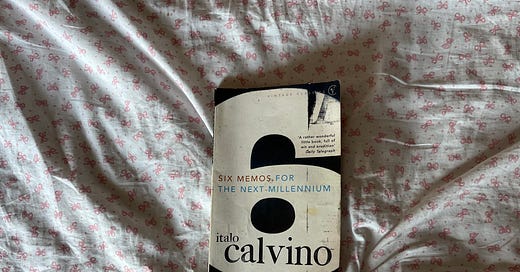Book-bliss #2: “Six memos for the next Millenium” by Italo Calvino
They need to invent a new word to describe the level of adoration I have for Italo Calvino. His irony and the way he mixes oneiric scenarios with deep meanings about life are to me, a book addict, what I imagine heroin is to a drug addict. I have read all his books, which explains why I have put my hands into his lesser-known work as well. Like a miner, I keep digging for any of his gems. “Six Memos for the Next Millennium” is one of them. When I found this old edition at @Tulibris in Brussels, an Ali Baba cave for book lovers, I nearly jumped in front of Peter, the bookseller.
The book is concise, as each chapter was meant to be a lecture he would give for the Charles Eliot Norton Lectures at Harvard. What he called “memos” are certain virtues that he considered important for the advancement of literature in the then-approaching millennium. Each lecture was intended to be devoted to each of the six qualities: lightness, quickness, exactitude, visibility, multiplicity, and consistency. Sadly, he completed only the first five, he died before writing the last.
1. Lightness
He claims that it is important for a text to feel weightless and free from unnecessary burdens. He advocates for a style that doesn't take itself too seriously and allows readers to move effortlessly through the narrative. In this, he recalls Milan Kundera’s style.
"The lighter the writing, the more it opens doors to unexpected and delightful meanings.”
In general, do we think our Western society is capable of “lightness”? I think we’ve become superficial, but cancel culture and the mob that follows any disliked opinion demonstrates it.
2. Quickness
He believes that a good narrative should move swiftly, capturing the reader's attention and maintaining their engagement throughout.
"Quickness is a sign of authenticity.”
This one is liberating for someone like me who has been hiding her dislike of Russian classic authors for a while. The idea of reading again 20 pages describing in detail the design of a room makes me puke. For ages, I have been taught that you cannot be a proper intellectual if you do not go around with those Russian book bricks. Calvino has freed me from guilt.
3. Exactitude
Calvino explores the idea of precision and accuracy in language. He contends that a writer's ability to describe things with great detail and clarity is vital for conveying deeper truths and emotions.
"Exactitude is not a formula; it is a moral attitude.”
This will make Grammar-Nazi feel extremely good, I know. But the point is that our reality is confined to the words we know and use correctly. You do not have the words to describe something you do not know. And when you know them, you have to respect life enough to describe it properly.
4. Visibility
This chapter centers on the notion of making the invisible visible through writing. Calvino argues that literature should strive to reveal hidden aspects of reality, allowing readers to perceive things in a new light.
"Literature should increase reality to the point of making it unbearable.”
This one I believe is the most difficult to attain. In the world of social media, it feels extremely difficult to say something new, to create something new, to have an original voice.
5. Multiplicity
He discusses the importance of embracing multiplicity and complexity in literature. He suggests that work should not limit itself to a single perspective but should incorporate diverse viewpoints and possibilities.
"Multiplicity is what I consider the truest expression of the inexhaustibility of the world."
Now, how damn hard is this in a world of increasing polarization? And how difficult is it to have the courage to connect different domains and interests when we are told that in order to have a successful career we need to become specialists at something?
For me, this book is a 9/10 because it provokes a reflection on what are the virtues we want to bring forward to progress as a society, it goes way beyond literature’s future. In the end, what is our reality if we do not focus on how we tell it to the next generations?
I do not give it a 10/10 because it is a tiny bit difficult to read if you do not have an interest in mythology and/or classic literature.
Vilma Djala





